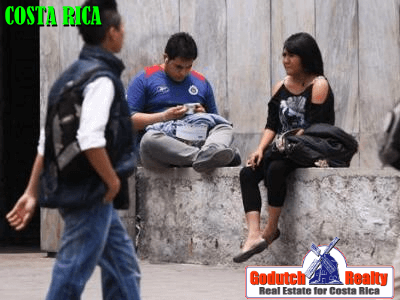Estimated Reading Time: 6 Minutes

Ninis? No, they’re not weird creatures from outer space.
Cultural diversity will many times interfere in your life once in a while when living in Costa Rica. Cultural differences between Costa Rica and your home country are plenty; you will find that out as soon as you move to Costa Rica. Our children are one of those cultural differences.
In the US, there are boomerang kids, which are those that return home to live with their parents, after previously living on their own. The other day, on a forum, I saw a question asked: “My adult son lives at home, should I charge him rent?”
In Costa Rica, we also have boomerang kids, when they divorce they go back to their parents. But more worrisome are the Ninis. Do you know what Ninis are? It’s an international phenomenon: the kids that won’t go away.
When I grew up, you’d leave the nest as soon you were an adult, which was quite normal. Most of the kids my age either had to do their mandatory army time or went to college and would never return home to live with mom and dad again.

A mental problem?
When I met my first wife here in Costa Rica, her 32-year-old brother was still living with her mom. He had long finished college and had been working for years. When I found out he was still living at home I was surprised and asked who was going to be my future wife if he had a mental problem or something.
Don’t move out till you marry
After a while, I started to find out that was quite normal in Costa Rica to live with mom and dad. Even if you’re an adult you don’t move out until you get married and when you start getting so many babies that you won’t fit anymore.
After a divorce
Even after a divorce, men and women alike would move back to their mom and dad. That feeling of having to go back to mom and dad was mutual; the parents wouldn’t expect anything different.

Change in the culture
Over the past 30 years, the cultural differences of the great middle class in Costa Rica have changed quite a bit, I assume due to travel, the internet, student exchanges, and jobs abroad. The young and well-educated people of Costa Rica now have a different mindset and they’re much more independent than they ever were. Studying is more affordable than it was in our time. Now kids do 2 or 3 careers and can’t get a job. Others see what’s going on and say “why bother”?
Car payments and credit card debt
My son has grown up as a hardworking kid, I guess because he received the right values. He started living on his own when he was 19, very unusual for Costa Rica. His cousins still live at home, just like their dad did (the one I told you about before). One is 29 and the other 34 years old. They both have a job but spend all their money on pot and cars. They both have a huge credit card debt, owe their cars and what else and mom and dad usually end up paying the pending debt and then the story starts all over again.
Once in a while, we still get retirees looking to move to Costa Rica but they don’t know what to do with their daughter who stays at home. The daughter has credit card debt, car payments to make, and doesn’t have enough income to pay rent. That doesn’t happen so often anymore, most parents have become much smarter than that and educated their kids to handle their own finances intelligently.

Informal jobs
In Costa Rica, many of my son’s friends who are between 25 – 30 years old have informal jobs because they are not able to pay off their credit card debt or make their car payments because they’re broke. If they’d get a formal job, the long line of creditors would make sure they wouldn’t receive a dime at the end of the month. The Costa Rican government seems not to worry about their youth being so indebted.
Ninis
There are thousands of kids who quit school before they graduated, many don’t have a job either. They are called Ninis, which means “ni studio ni trabajo” (no studies no job, which would be Nonos in English). In 2011, there were 201,870 Ninis and in 2016 we have 168.000. Costa Ricans were never really good at holding a census, so who knows about those numbers.
Depending on where you are living in Costa Rica or will be living once you move here, get to know the neighborhood, watch out for the Ninis and see if you can help them a little bit by giving them odd jobs and teaching them the values that their parents couldn’t or were not interested in.
Lend a helping hand
There seem to be over 260 million Ninis worldwide. Helping the Ninis in Costa Rica could be your good deed, your way of returning a little bit to the country that adopted you. Ask around in your hood, I’m sure you’ll find a few that can use your help. Thank you!
Main Image: Photo by Trevor Buntin on Unsplash
If you like this blog, subscribe to my newsletter by clicking the banner below.
I DO want to remind our readers that we appreciate any referrals you can send us. Also, please remember the GoDutch Realty agents when you talk about your home in Costa Rica, we appreciate it.

























